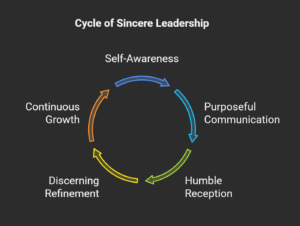The Balance of Listening and Leading in Leadership
Have you heard the quote from Martyn Lloyd-Jones: “Talk to yourself instead of listening to yourself”? Lately, I’ve come across this idea in various places—a speaker, a podcast, a LinkedIn reel, and in the book The Hole in Our Holiness by Kevin DeYoung. It’s a thought-provoking challenge to be intentional about speaking truth over our emotions rather than being ruled by them.
At first glance, this idea resonates deeply. We must be intentional about speaking truth over our emotions rather than being ruled by them. But let me ask: When was the last time you truly listened to yourself? Not just your surface-level thoughts or fleeting emotions, but the deeper, quieter voice that reveals your fears, desires, and convictions?
Too often, we either get consumed by unchecked thoughts or silence them entirely. Ignoring them may seem like the safer option—after all, overanalyzing can lead to self-doubt. But the danger of not listening to ourselves at all is that we become disconnected from our own emotions, motives, and even our calling. We risk leading from a place of reaction rather than reflection.
While speaking truth to ourselves is essential, a sincere leader requires something deeper—it demands a willingness to listen with discernment and lead with wisdom before engaging with others.
Navigating Leadership: The Captain and the Sea
Think of leadership like a captain navigating the sea. The waves—our thoughts, emotions, and inner narratives—are always present. A wise captain does not ignore the water, nor does he allow it to dictate his course without discernment. Instead, he listens to the currents, reads the winds, and then steers with wisdom. True sincerity in leadership does the same—it listens, it understands, and then it leads.
The Power of Self-Disclosure and Reflective Feedback: The Heartbeat of Sincere Leadership
Leadership is not just about casting vision, making decisions, or driving performance. At its core, leadership thrives on connection. And at the heart of meaningful connection lie two essential practices: self-disclosure and reflective feedback. When woven together with wisdom and intentionality, these practices create a culture of trust, authenticity, and continuous growth. They are not separate disciplines but interconnected forces—one an intentional offering, the other a discerning response. Together, they form the foundation for sincere leadership, where vulnerability and truth serve as catalysts for transformation.
Self-Disclosure: The Heart of Authenticity
Self-disclosure is the courageous act of sharing a part of oneself—personal experiences, struggles, or lessons—in a way that fosters connection. But true self-disclosure is not a monologue of self-expression; it is a dialogue of trust. A sincere leader first listens to their own heart before offering it to others.
In a world often marked by guardedness and pretense, self-disclosure reminds us that connection begins with openness. But openness does not mean indiscriminate sharing; it means thoughtful revelation—discerning what will build trust rather than seeking attention or validation. A leader who overshares without wisdom risks creating discomfort; a leader who withholds everything risks disconnection.
The wisdom of self-disclosure lies in knowing what to share, when to share it, and why it matters.
The Power of Self-Disclosure
When practiced wisely, self-disclosure has a profound impact:
- Builds Relational Warmth and Trust – Sharing personal experiences humanizes leaders, breaking down barriers and fostering trust. This openness signals to others that it is safe to share their own stories.
- Fosters Emotional Connection – Personal stories create moments of shared humanity, strengthening bonds within teams. Emotional connection, in turn, enhances collaboration and morale.
- Creates a Culture of Honesty and Transparency – When leaders model authenticity through self-disclosure, they inspire others to embrace honesty and transparency, cultivating a culture where vulnerability and trust thrive.
Reflective Feedback: The Mirror of Growth
If self-disclosure is about sharing, reflective feedback is about receiving and offering insights that foster mutual understanding and alignment. It is not merely about giving critique; it is about attuning ourselves to the truth found in others’ perspectives. True growth happens in the space where courageous self-expression meets humble self-reflection.
A leader who dismisses feedback isolates themselves from reality. A leader who internalizes every critique loses confidence and clarity. Sincere leadership listens, sifts, and responds with wisdom.
A Lighthouse, Not a Floodlight
A wise leader understands that illumination is not the same as exposure. A floodlight reveals everything at once, often blinding and overwhelming those in its reach. A lighthouse, however, shines with purpose—it doesn’t demand attention, but it offers just enough light to guide others safely forward.
Self-disclosure works the same way. Leaders don’t share to put themselves at the center of attention; they share to provide clarity, encouragement, and direction for those they lead. True sincerity isn’t about making yourself the focal point—it’s about illuminating a path where others can walk with confidence.
Creating a Cycle of Sincere Leadership
When leaders integrate self-disclosure and reflective feedback with sincerity, they create a cycle of continuous growth:
- Listen to yourself first – Self-awareness precedes self-disclosure.
- Speak with wisdom and purpose – Self-disclosure should serve connection, not validation.
- Receive feedback with humility – Reflective feedback is a gift that refines leadership.
- Discern and refine – Not all feedback is equally valid; sift through it with wisdom.
- Repeat the process – Growth is a continuous journey, not a one-time event.
Final Thought: Leading with Sincerity
Sincere leadership does not mean leading perfectly—it means leading authentically, humbly, and with intentionality. It is about embracing both the courage to share and the humility to listen. When leaders master the art of self-disclosure and reflective feedback, they don’t just build better teams; they cultivate deeper trust, stronger connections, and lasting transformation.
Lead with sincerity. Listen deeply. Speak wisely. Grow continually.

